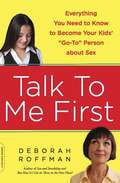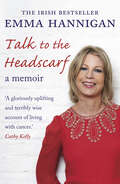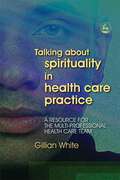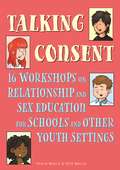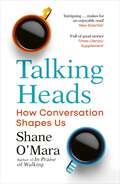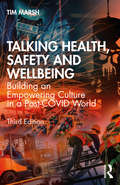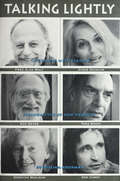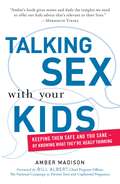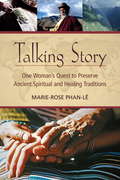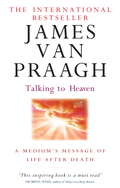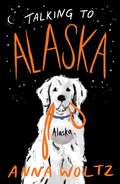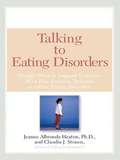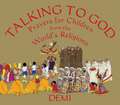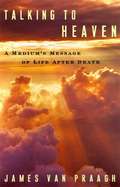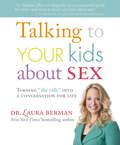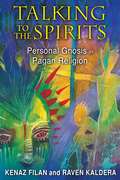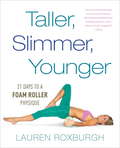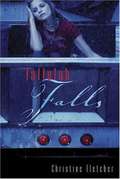- Table View
- List View
Talk to Me First: Everything You Need to Know to Become Your Kids' "Go-To" Person about Sex
by Deborah RoffmanWe live in a time when kids of all ages are bombarded with age-sensitive material wherever they turn; "sexting" and bullying are on the rise at an increasingly younger age, and teen moms are "celebrified. " What is a concerned--and embarrassed--parent to do? With wit, wisdom, and savvy, Deborah Roffman translates her experiences gleaned from decades of teaching kids and parents, and as a mom, into strategies to help parents navigate this tricky terrain. Talk to Me First is for any parent who wants to become and remain the most credible and influential resource about sexuality in their children's lives.
Talk to the Headscarf: Fighting Cancer. Finding Hope.
by Emma HanniganEmma Hannigan was thirty-two and married with two small children when she found out that she had an 85 per cent chance of developing cancer.Over the following year she had a double mastectomy and both ovaries removed, reducing her cancer risk to five per cent.But then her worst fears were realised.Cancer struck anyway.Talk to the Headscarf is the story of how she lived, laughed and overcame some of the toughest times in her life.Emma has now battled cancer eight times. In this inspirational account, she shares with us the highs and lows of her astounding story and shows us that, against the odds, life can and does carry on.
Talking About Spirituality in Health Care Practice: A Resource for the Multi-Professional Health Care Team
by Gillian WhiteHealth care professionals who endeavour to work holistically face a number of questions about spirituality. What is meant by `spirituality' as opposed to `religion'? What is its specific relevance to health care practice? This accessible book provides answers to these questions and offers a model for personal and professional development. Gillian White sets out a framework within which health care professionals can discuss spirituality and equip themselves to respond appropriately to the spiritual concerns of their patient in daily practice. She draws on her experience of sharing and discussing spirituality and spiritual care with other health care professionals and proposes that multi-professional health care teams should talk about spirituality in challenging but safe environments to develop shared understanding of it, and to increase their confidence about integrating spiritual care into their daily practise. This text is a useful contribution to the multi-disciplinary, whole-person approach in health care and will be of interest to all health care professionals, nursing staff and students in these fields.
Talking Consent: 16 Workshops on Relationship and Sex Education for Schools and Other Youth Settings
by Pete Wallis Thalia WallisThis book provides teachers and parents with the 'need-to-knows' to educate groups of young people about consent, pornography, sexting and many other related topics, as well as giving them the tools to ward themselves against abusive behaviour.Initiating a discussion with young people on topics around sex can seem daunting, but Talking Consent is full of lesson plans, workshops and creative ideas for introducing and promoting constructive discussions around these areas - while also dispelling common myths, and giving appropriate answers to difficult questions that may arise from these discussions. Inclusive of everybody, including the LGBT+ community and people with disabilities, this book will provide professionals with the information they need to spark and shape conversation around these complex issues in an assured way.
Talking Heads: The New Science of How Conversation Shapes Our Worlds
by Shane O'MaraFrom neurons to nations, Talking Heads is a stunning survey of the science of human connection and communication.'Delightfully well-written' IRISH TIMES'Intriguing ... Makes for an enjoyable read' NEW SCIENTIST'Full of good stories' TIMES LITERARY SUPPLEMENTTalking to each other is a primal behaviour. It’s a key part of what makes us human. Yet the science of human connection has largely remained a mystery. Only recently have scientific advances allowed us to peer into the purpose of conversations and uncover their extraordinary impact.In this groundbreaking book, the first of its kind written by a leading neuroscientist, Professor Shane O’Mara expertly reveals how talking affects all our lives. What does it mean that we mostly think, and speak, in five-minute bubbles around the present moment? Is the fact that we instinctively trust what others say empowering or a hindrance? And how do our very nations begin as conversations?Moving from the personal to the social and ultimately towards an urgent and radical new perspective on the defining phenomenon of our times, populist nationalism, Talking Heads is the story of how conversation shapes us and constructs our worlds – and how, together, we can talk our way into a better tomorrow.
Talking Health, Safety and Wellbeing: Building an Empowering Culture in a Post-COVID World
by Tim MarshThe book considers what makes an excellent face-to-face health and safety contact in the workplace, and why these contacts are a fundamental building block of any strong, caring, and empowering workplace culture. It stresses the vital importance of inquiry, empathy, and analysis in understanding what employees need to mitigate risk factors around safety and mental health. This revised and updated edition includes empowering methodologies that directly address mental health and well-being issues and the challenges organisations face in a post COVID19 era. The reader will gain an understanding of the day-to-day mechanisms of why “culture is king” and how everyone contributes every-day to this truism. This book covers how interactions regarding leadership and teamwork directly lead to the amount of human error and fallibility an organisation can expect to need to manage, and how taking proactive, analytical, and empowering approaches to safety and health is key to identifying and mitigating risks. Talking Health, Safety and Wellbeing explains why it is so important to talk about health and safety issues proactively. Written in an accessible and engaging manner, this book is an ideal read for any frontline supervisor, HR manager, mental health first aider, safety rep, or company director.
Talking Lightly
by William KoopmanTalking Lightly was originally published in print form in 1994.Talking Lightly features interviews with twelve prominent personalities of new thought - figures who have helped define the New Age Movement. Author William Koopman, former editor and publisher of The Light provides a description of each person's history and accomplishments and describes how the interviews came about. These fascinating and intimate discussions explore many different concepts: from firewalking to music, from self-awareness to the tapping of inner strength.Talking Lightly will challenge readers to rediscover and reassess their perception of the world around them.
Talking Sex With Your Kids: Keeping Them Safe and You Sane - By Knowing What They're Really Thinking
by Amber MadisonForget feeling embarrassed about having "the talk" with your kids. Research shows you're the one they want to hear from when it comes to sex ed. Now you have a unique advantage to getting through to your child as Amber Madison lets you in on what your kids are really thinking. As a twenty-six-year-old award-winning author and lecturer, she's taught thousands of parents how to approach kids so they'll really listen.Inside this helpful guide, you learn:How to get comfortable enough to be open with your childrenEverything you need to know about sexually transmitted diseases and contraceptionThe best way to talk to girlsThe most successful way to get through to boysHow to deal with the unexpectedAnd most importantly, yes, your kids will listen to you With insider advice on how to speak frankly without giving TMI (too much information), Talking Sex with Your Kids will encourage you to teach them to be safe and smart when it comes to sex.
Talking Story
by Marie-Rose Phan-LeA fascinating adventure into the world of healing, shamanism, plant medicine, and divination, Talking Story documents author Marie-Rose Phan-Lê's worldwide journey to find healing and truth from authentic mystics and shamans, while recording their disappearing traditions and discovering her own gift as a healer. Facing a crisis of faith after a profound betrayal by her New Age spiritual teacher, Phan-Lê is set on a path toward the exploration of the Old World. Learning that many indigenous cultures were on the verge of losing their medicinal plants, healing traditions, and spiritual knowledge as a result of habitat destruction, cultural assimilation, and globalization, she travels the globe, meeting with healers and shamans and documenting their practices. Describing each exciting leg of her journey, Phan-Lê embarks on a life-changing odyssey that takes her to remote corners of the globe including Eastern Peru, Hawaii, Nepal, India, Vietnam, and China. In the midst of her exploration, she begins to connect with her own healing roots, following in the footsteps of her aunt who in Vietnam had been a healer. Once back in the U.S., Phan-Lê's spiritual development continues and she decides to use media as medicine and to be a medium for healing. This book is part of a greater cross-platform of spiritual media that includes Phan-Lê's accompanying award-winning feature-length documentary film Talking Story and her nonprofit organization Healing Planet Project that is dedicated to the preservation and presentation of healing and spiritual traditions through media.
Talking To Heaven: A medium's message of life after death
by James van PraaghJames Van Praagh enjoys an extraordinary gift - he can communicate with the spirits of men, women, children and animals who have died. Possessing the rare ability to bridge the gap between the physical and spiritual worlds, he provides comfort to those who have lost loved ones and brings back powerful messages from the other side.In this inspiring book, he shows us what lies beyond our visible world and answers our most profound questions about life after death. Part spiritual memoir and part instructional guide, this international bestseller offers a powerful and inspiring message about the world beyond. Filled with hope and enlightenment about our spiritual future, it is a book that will change the way you look at death and life.
Talking about Acupuncture in New York
by J. R. WorsleyThe book is on a seminar given by Professor J. R. Worsley in 1980 to members of the Arica Institute and the public on acupuncture.
Talking to Alaska
by Anna WoltzA powerful story of two unlikely friends brought together by the love of a dog It only takes one day at their new school for Parker and Sven to become mortal enemies. Parker's had a terrible summer and just wants to be invisible, while Sven is desperate to make an impression and be known as anything other than "that boy with epilepsy." When Parker discovers her beloved dog Alaska – who she had to give away last year – now belongs to Sven, she's determined to steal Alaska back. Of course, that's easier said than done...
Talking to Alaska
by Anna WoltzA powerful story of two unlikely friends brought together by the love of a dog It only takes one day at their new school for Parker and Sven to become mortal enemies. Parker's had a terrible summer and just wants to be invisible, while Sven is desperate to make an impression and be known as anything other than "that boy with epilepsy." When Parker discovers her beloved dog Alaska – who she had to give away last year – now belongs to Sven, she's determined to steal Alaska back. Of course, that's easier said than done...
Talking to Eating Disorders
by Claudia J. Strauss Jeanne Albronda HeatonWhen a friend or family member shows signs of an eating disorder, the first impulse is to charge in, give advice, and fix what is wrong. But these tactics-however well-intentioned-can backfire. This compassionate guide offers ways to tackle the tough topics of body image, media messages, physical touch, diets, and exercise-along with a special section on talking about these issues with children. It includes information about when to get professional help, how to handle emergencies, and answers to difficult questions such as "Am I too fat?" or "Is this ok to eat?"
Talking to God: Prayers for Children from the World's Religions
by DemiIn this beautifully illustrated book of short prayers from major world religions, award-winning author Demi shows children the great value of talking to God. Here they will find many time-honored favorites, including prayers of praise, prayers of petition, prayers of gratitude, and prayers of blessing. Taking readers on a fascinating journey across the globe, Demi&’s stunning illustrations celebrate the life of prayer shared by all the world&’s religions. Moving from King Solomon&’s Temple and the Dome of the Rock in Jerusalem to St. Mark&’s Cathedral in Venice to the Delhi Mosque and the River Ganges in India; from North America to Central Africa to China and Japan—each exciting new illustration transports readers to a holy destination where they can experience the religion&’s life of prayer directly at its source. Religions featured are Judaism, Christianity, Islam, Hinduism, Buddhism, Taoism, Shintoism, American Plains Indian, and Central African. Also included are an author&’s preface and an informative appendix with helpful notes on the prayers and illustrations.
Talking to Heaven
by James Van PraaghIn this bestselling book, author James Van Praagh shares many personal and deeply moving stories of after death communication. He then gives examples of how one can learn to meditate and improve one's psychic abilities.
Talking to Myself
by Marshall Saper"Let us get one thing straight. Nothing that I have written in these pages is designed to turn your life around. Nor do these articles contain exotic psychological information that will lead you to the promised land of happiness and fulfillment. If there is anything that the reading public does not need, it is additional expert advice on weight reduction or emotional self-help. Why, then, am I taking to the typewriter? Because I am talking to myself, and it would look odd if I did so verbally. By pounding out my ideas on a typewriter, I can pretend to be an author and at the same time clarify my own thoughts on the increasing public impact of my profession, psychology."
Talking to Your Kids About Sex: Turning “The Talk” Into a Conversation for Life
by Laura BermanTeaching your child about sex can be a rewarding, relationship-strengthening experience. You just need to be equipped with the right tools: clear, easy-to-explain information; critical questions to ask; good timing; and a sense of humor. Often touched on only lightly in schools, sexual knowledge is one of the most important parts of your child's education. Help encourage positive thought, relationships, and decision-making with Dr Berman's resourceful, reassuring, and comprehensive new book.
Talking to the Spirits: Personal Gnosis in Pagan Religion
by Raven Kaldera Kenaz FilanA guide to direct communication with the spirits and the Gods • Offers practices for seekers and groups to learn to hear and respond to the spirits and the Gods as well as what to do (and not do) if you receive a message • Explains how to authenticate spiritual messages with divination • Discusses how to avoid theological conflicts when someone’s personal gnosis differs from that of their Pagan group For our ancestors the whole world was alive with spirits. The Gods bubbled forth from rivers and springs and whispered in the breezes that rustled through cities and farms. The ground underfoot, the stones, the fire that cooked the food and drove off the darkness, these all had spirits--not just spirits in some other dimension, but spirits in them who could be spoken to and allied with. In today’s world we are led to believe that the spirits long ago went silent and that spiritual wisdom can only be gained through established religious doctrine. Providing a guide for opening two-way conversation with the spirits of daily life as well as direct communication with the Gods, Kenaz Filan and Raven Kaldera explore how to enrich your spiritual path with personal gnosis--asking your Guides for assistance or teachings and receiving a response. They explain how to develop your sensitivity to the voices of the Divine, discern genuine spiritual messages from the projection of internal psychodrama, and what to do (and not do) with the messages you receive. Confirming their own personal gnosis with Northern Tradition Pagan beliefs and Greco-Roman, Celtic, Egyptian, and indigenous hunter-gatherer lore, the authors discuss how to avoid theological conflicts when someone’s personal gnosis differs from that of their Pagan group as well as how to authenticate messages with individual and group divination. Offering practices and principles for seekers and groups, they reveal that the spirits never went silent, we simply forgot how to hear them.
Talking with Angels of Light: Embrace your Truth
by Amanda HartAmanda Hart was rescued by guardian angels as a child and from thence on they became a beacon of hope throughout her turbulent journey into womanhood. The illuminating conversations she has with her angels remain an important aspect of her everyday life, bringing her continual support and spiritual fulfilment. She now dedicates her life to helping others connect with their own angels, helping them to find deeper meaning and happiness in their lives.Talking with Angels of Light is a book for you if the values and beliefs that have guided your life so far are based on destructive relationships, negative emotions or traumatic experiences from your past. Amanda Hart will teach you how to open your heart and allow your angels to save you from darkness and bring you into the light where you belong.The book includes meditations to connect with your angels of light, space to record the blessings they send you and real accounts of angelic assistance granted to Amanda and her clients over the years. There are also practical exercises, Amanda calls 'Your Lightbulb Moments' that will make you more aware of the brilliance in the world around you. Soon you will emerge from the shadows of despair and shine like the purest light in the universe, glowing from the inside out.
Talking with Angels of Light: Embrace your Truth
by Amanda HartAmanda Hart was rescued by guardian angels as a child and from thence on they became a beacon of hope throughout her turbulent journey into womanhood. The illuminating conversations she has with her angels remain an important aspect of her everyday life, bringing her continual support and spiritual fulfilment. She now dedicates her life to helping others connect with their own angels, helping them to find deeper meaning and happiness in their lives.Talking with Angels of Light is a book for you if the values and beliefs that have guided your life so far are based on destructive relationships, negative emotions or traumatic experiences from your past. Amanda Hart will teach you how to open your heart and allow your angels to save you from darkness and bring you into the light where you belong.The book includes meditations to connect with your angels of light, space to record the blessings they send you and real accounts of angelic assistance granted to Amanda and her clients over the years. There are also practical exercises, Amanda calls 'Your Lightbulb Moments' that will make you more aware of the brilliance in the world around you. Soon you will emerge from the shadows of despair and shine like the purest light in the universe, glowing from the inside out.
Talking with Angels of Love: Open your Heart
by Amanda HartThere was once a time in Amanda Hart's life when she did not know how to be secure in her own worth, was a stranger to self-love and found herself constantly trapped in a cycle of toxic relationships, coercive control and an overwhelming sense of lonliness. Somehow she summoned enough faith to form an astonishing connection with her guardian angels, which became the only remedy for emotional trauma she experienced from early childhood into adulthood.Amanda's angels taught her that we are all worthy of an authentic, non-judgemental love. Now she devotes her life to helping others open their hearts and receive angelic assistance. Talking with Angels of Love will show you how to accept your circumstances, love the skin you are in and recognise the difference between healthy love and toxic love. Filled with practical exercises, meditations to channel your angels' love, pages to record their loving messages and touching real-life stories about the healing power of love, this book will soothe your soul and help you to trust the goodness in others again. Amanda believes that if you open your heart to the angels their love is everlasting, and you will never be lonely again.
Talking with Angels of Wealth: Receive their blessings
by Amanda HartAmanda Hart was rescued by guardian angels as a child and from thence on they became a beacon of hope throughout her turbulent journey into womanhood. The illuminating conversations she has with her angels remain an important aspect of her everyday life, bringing her continual support and spiritual fulfillment. She now dedicates her life to helping others connect with their own angels, helping them to find deeper meaning and happiness in their lives.From the author of Talking with Angels of Light comes another empowering and life-altering book. Amanda Hart's connection with her guardian angels has taught her how to unlock her power, purpose and voice when it comes to financial matters. By following practical exercises, meditations and reading real-life anecdotes this book will guide you towards a healthy, revitalised relationship with money.
Taller, Slimmer, Younger
by Lauren RoxburghFrom the A-list bodyworker, trainer, and alignment expert dubbed "the body whisperer" by Gwyneth Paltrow's Goop comes Taller, Slimmer, Younger --a powerfully simple daily foam roller routine to help you sculpt longer, leaner muscles, stand an inch taller, look ten pounds slimmer, and renew your body and mind. Are you ready to roll? ALIGN YOUR BODY, ALIGN YOUR LIFE There's a new buzzword in the fitness world: fascia. It's the connective tissue that wraps around your muscles and organs and helps keep everything in place. But in our increasingly busy and often stressful lives, tension and toxins are often stored within our fascia, resulting in serious long-term consequences including poor posture, excess weight, acute anxiety, and chronic pain. Fitness and alignment expert Lauren Roxburgh--who has worked with such stars as Gwyneth Paltrow, Gabby Reece, Melissa Rauch, and Baron Davis--has the solution to keep your fascia supple, flexible, and strong. Using only a foam roller, you can reshape and elongate your muscles for a leaner, younger look, while also releasing tension, breaking up scar tissue, and ridding yourself of toxins. In just fifteen minutes a day, Roxburgh's 21-day program will guide you through a simple series of unique rolling techniques that target ten primary areas of the body, including the shoulders, chest, arms, legs, hips, butt, back, and stomach. The result is a healthy, balanced, aligned body that not only looks but feels fantastic. Advance praise for Taller, Slimmer, Younger "As an athlete with a lifelong passion for fitness and wellness, I am always looking to get an edge in my body, and Lauren Roxburgh has helped me do just that. Lauren's philosophy will rejuvenate your body and spirit, helping you look and feel lighter and brighter, reducing stress and tension, while dramatically improving your stance in your body and also in your life!"--Gabby Reece, U.S. beach volleyball champion "This book is sure to become the body bible for anyone who wants to live a healthy, fit, and balanced life."--Melissa Rauch, actress, The Big Bang Theory and True Blood "Lauren's method has rejuvenated my spirit, giving me more energy and strength, which has allowed me to perform better on and off the court."--Baron Davis, two-time NBA all-star"Lauren's method sculpts the body's soft tissues, slimming and streamlining whatever part you work. She's a 'body whisperer!'"--GoopFrom the Trade Paperback edition.
Tallulah Falls
by Christine FletcherWhen Tallulah Addy sets out on an impulsive cross-country trip to rescue her best friend, she doesn't anticipate getting stranded in rural Tennessee without a dime. Nor does she guess that rescuing a dog will land her a job in the local veterinarian's office. But there, under the wary eye of ornery Dr. Poteet, Tallulah works harder than ever before, tending to animals of all shapes and sizes--and unexpectedly, to wounds long-buried in herself. Tallulah swears she'll leave the first chance she gets, yet when given the choice, it may prove harder to keep the promise to her friend than to say good-bye to the strangers who have become her new family.
